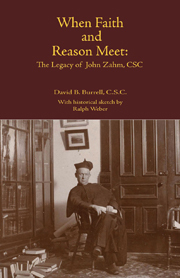
Despite his unquestionable influence on science, philosophy, theology, higher education, the Catholic church in general, and the University of Notre Dame in particular, Rev. John Augustine Zahm, C.S.C., seems to have attracted the attention of only one very serious biographer, Ralph Weber, a Notre Dame alumnus who wrote his 1956 doctoral dissertation on Father Zahm and published it six years later.
After nearly half a century, Weber has been joined by Rev. David B. Burrell, C.S.C., Rev. Theodore M. Hesburgh, C.S.C., Professor Emeritus of Philosophy and Theology at Notre Dame, whose book, “When Faith and Reason Meet: The Legacy of John Zahm, C.S.C.,” was recently published by Corby Books.
It is forgivable to wonder why it has taken so long. The obscurity in which Zahm’s name has lingered since his death in 1921 is simply one more fascinating aspect of a fascinating life.
He arrived at Notre Dame from Huntington, Ind., as a 15-year-old in 1867, when the University was only 10 years older than he was. Though he stumbled in his studies, failing mathematics and German in his sophomore year, his academic record, no less than his extracurricular performances in debate and public speech, soon took on a radiant glow. By the time he was ordained a priest of the Congregation of Holy Cross in 1875, Zahm already was making a name for himself on and beyond the campus.
He loved literature, particularly Dante, but his superiors assigned him to teach (and study) physics and chemistry, a pursuit in which his success had much to do with the transformation of Notre Dame from a sort of trade school into the university it is today. He argued, wrangled, raised funds for and acquired the age’s best laboratory equipment, built a nationally respected science hall and, both literally and figuratively, electrified the Notre Dame campus in 1881.
Widely celebrated as a scholar of science and philosophy in an age stirred by the theories of Charles Darwin, Zahm wrote and lectured persuasively on the compatibility of evolution theory and Christian faith, but not persuasively enough for some curial officials in Rome, who tried, though unsuccessfully, to have his book “Evolution and Dogma” placed on the agreeably bygone Index of Forbidden Books.
Frustrated as Zahm may have been by such misunderstandings as those he encountered in Rome and at Notre Dame, he always seemed able to take them in stride.
“Tempermentally, he was an adventurer,” Father Burrell observes, “who undertook exploratory travel when his proposals for exploring the frontiers between science and faith were thwarted by ecclesial authorities, and his ambitions for advancing his nascent university, Notre Dame, into full-fledged university status were blocked by members of his own religious community who were administering it.”
His exploratory temperament rendered Zahm highly susceptible to intellectual curiosity and wanderlust alike, and he was among the most peripatetic characters of his time. Another was
his good friend, the former Rough Rider and president Theodore Roosevelt, with whom Zahm
shared a love of Dante and an interest in natural history. He accompanied Roosevelt on an arduous South American expedition in 1913, and later wrote about it under the pseudonym H.J. Mozans.
Stricken by pneumonia, Father Zahm died in a Munich hospital Nov. 10, 1921, his thirst for discovery still unslaked. He had been planning a journey from Constantinople to Baghdad, to deepen what Father Burrell describes as his “prescient reflections on the Islam of his day.”
According to Father Marvin O’Connell, professor of history emeritus at Notre Dame and himself the magisterial biographer of Notre Dame’s founder, Rev. Edward Sorin, C.S.C., “When Faith and Reason Meet” is “an excellent reappraisal bringing up to date our knowledge of this fascinating man. Here is one who revolutionized the teaching of science at Notre Dame. Here is one who, during an age of intense (and sometimes cowardly) caution in Catholic circles about such matters, faced the challenge of scientism in such books as ‘Evolution and Dogma’ and ‘Scientific Theory and Catholic Doctrine.’
“Here is one who, despite the prejudices of the time when the ‘cult of domesticity’ was in the ascendancy, boldly set out and stoutly defended the achievements women had secured in scientific research. And yet, at the same time, here is one who understood and exalted the very best in medieval Catholic tradition. Burrell has brought a contemporary light to bear on the remarkable career of this truly Renaissance man, and done so to a large extent by letting Zahm speak for himself.”
For anyone who has honestly considered his extraordinary life and work, it is hard to imagine a better way to let Father John Augustine Zahm speak.
Contact: Jim Langford, 574-784-3482 or jimtach@aol.com